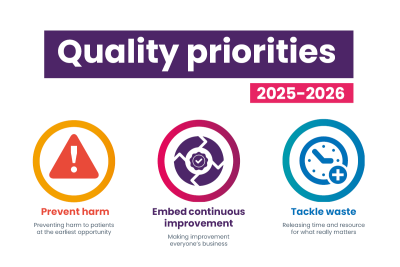Infection prevention and control
Each year, we select quality priorities which determine areas of improvement work that we formally report on in our quality account.
The aim for these priorities is to continue to improve patient experience, safety, and clinical effectiveness for our service users.
Quality priorities for 2024/25
In 2024/25 we focused on three quality priorities:
- To focus on the risk and impact of deconditioning for patients in hospital and the community
- To make services accessible for adults, children and young people, and improve how we meet the needs of patients and carers (accessible information and reasonable adjustments)
- To develop our quality improvement approach
These quality priorities concluded at the end of 2024/25. Outcomes have been positive, and we have clear follow-on actions for sustaining improvements:
Deconditioning
We have seen a 26% increase in staff reporting a ‘good’ or ‘very good’ understanding of deconditioning, since April 2023.
The Trust developed and tested a deconditioning prevention approach, badged Eat, Drink, Dress, Move (EDDM), using evidence based clinical practice to prevent hospital acquired deconditioning and reduce the negative impacts of inactivity and immobility for patients spending time in hospital.
Throughout the EDDM deconditioning project, 85% of inpatients on pilot wards had personalised activity plans set with 90% of these achieved, on average.
An EDDM continuous improvement programme, clinically led by a team of nurses and therapists, and underpinned by continuous improvement methodology, was launched in April 2025.
Making services accessible
Staff training has been delivered to assist the routine recording of reasonable adjustments, and we have developed a new ‘information hub’ which provides practical support and guidance for staff in meeting the needs of patients. This has been supported by a communications campaign, enabling clear and consistent messaging on our legal duty around reasonable adjustments, to raise awareness for both staff and patients.
Data tells us that 61% of patients with a Reasonable Adjustment Digital Flag (RADF) advised that we met their reasonable adjustment needs where appropriate and 63% of staff are asking patients about their reasonable adjustment needs.
We are continuing to work with colleagues across South West London to introduce a standard Reasonable Adjustment Digital Flag for acute hospitals and also continuing to monitor how we are using the RADF within our services and improving our offer to service users.
Developing our quality improvement approach
We have designed a model for improvement which will help us to take a consistent and effective approach to change and improvement across the organisation. This shared approach is underpinned by a refreshed quality improvement training offer for staff and a new set of tools that will help staff to navigate the improvement journey.
Quality improvement has been incorporated into the Trust’s Board development programme and since April 2024, an additional 193 staff have been trained in quality improvement methods across acute and community services.
Our strategic plan for quality improvement includes milestones for 2025/26 and beyond. Progress against these milestones and further development of the plan will be directed through our Quality Improvement Committee and supported by our Quality Improvement team.
Quality priorities for 2025/26
We recently engaged with staff, partners and stakeholders to finalise our quality priorities for 2025/26, which are:
- Prevention of harm (preventing harm to patients at the earliest opportunity)
- Embed continuous improvement in daily work (making improvement everyone’s business)
- Tackle waste (releasing time and resources for what really matters)

We are developing workstreams to support our work in each of these areas.
If you would like further information, you can contact the Trust's Quality Improvement team: krft.